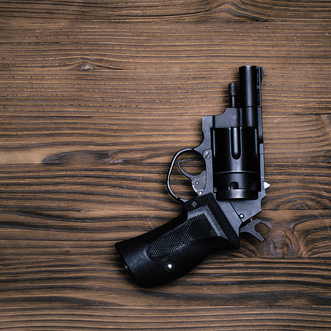Town justice who brandished gun at defendant should be ousted, judicial conduct commission says

Image from Shutterstock.
A town and village justice in Whitehall, New York, should be removed from office for brandishing or pointing a handgun at a defendant and then apparently bragging about it in racial terms, according to the New York State Commission on Judicial Conduct.
The judicial conduct commission made the recommendation to oust Justice Robert J. Putorti in a Sept. 9 determination, according to a Sept. 22 press release from the commission.
Putorti, who is not a lawyer, is licensed to carry a concealed gun. He was advised during judicial training in December 2013 that he could legally carry a concealed firearm to the bench. Putorti used a magnet to keep his gun attached to the underside of his bench desktop before the incident.
Putorti brandished his handgun at Brandon Wood, the defendant, in late 2015, according to the statement of facts. Putorti told ethics regulators that he feared for his safety, but he now acknowledges that he had no reasonable basis to think that the defendant was going to use deadly force against him.
Putorti had twice mentioned the incident to other judges, describing the defendant as a “big Black man” and exaggerating his size, according to the statement of facts. The second time was at an October 2018 judges’ meeting during a discussion about courtroom security. Putorti said he pulled his gun because the defendant had passed the “stop line” in his courtroom.
Putorti told the judges at the meeting that a police officer in the court joked about how quickly Putorti was able to pull his gun. During his ethics hearing, Putorti said he mentioned the incident at the meeting because he was seeking advice on how to handle such situations.
Putorti later told his supervising judge that he doesn’t keep a bullet in his concealed gun, but it would take him a split second to load. He described the defendant as a “large Black man” about 6 feet, 9 inches tall who was “built like a football player.”
Wood was actually 6 feet tall and weighed 165 pounds.
Putorti told the supervising judge that the incident happened after the defendant ran quickly to the bench and came within about two feet of Putorti. Putorti said he pointed his gun at the defendant, told him to stop and directed him to move behind the line where defendants are supposed to stand.
Putorti later told the judicial conduct commission that he made a “fanning motion” with the gun but did not point it at Wood or anyone else.
The presiding judge advised Putorti that he can’t display his gun to a defendant unless he reasonably thinks that he has to defend himself or another person from the imminent use of deadly force. Putorti agreed to comply with that directive, and he no longer carried a gun to the courthouse.
In another incident, Putorti used his personal Facebook page to promote fundraisers for the Whitehall Elks Lodge. The Facebook page identified Putorti as a machinery equipment operator. His position as a judge wasn’t mentioned, but some of his Facebook friends were aware of it.
The judicial conduct commission said Putorti engaged in “highly inappropriate conduct” when he brandished his gun, created an appearance of judicial bias when he mentioned the defendant’s race in recounting the incident, and showed a “serious lack of judgment” when he apparently bragged about the incident.
“A courtroom is no place for a judge to brandish or point a gun at a litigant,” the commission said.
A dissenter argued that removal is “unjust, unwarranted and overly harsh” for Putorti’s conduct. He pulled a gun in a “single isolated courtroom incident” that “constituted, at worst, poor judgment,” the dissent said.
No one had filed a complaint about Putorti’s conduct, according to the dissent. Instead, the commission initiated the investigation after Putorti’s supervising judge requested an ethics opinion related to the issue.
The dissent also said there is proof that Putorti isn’t racist because of his reaction to a request from the defendant’s wife when the defendant was jailed for failure to pay a fine in a separate case. Putorti used his lunch hour from his other job to resentence the defendant to community service, so he could be released from jail.
The dissent also said the record doesn’t support the conclusion that Putorti was bragging about the incident, although that was one judge’s impression.
The dissent would have imposed an admonition or, “at the very worst, censure.”
Putorti received a copy of the recommendation Sept. 14. He has 30 days to accept the determination or request a review by the New York Court of Appeals.
Write a letter to the editor, share a story tip or update, or report an error.


